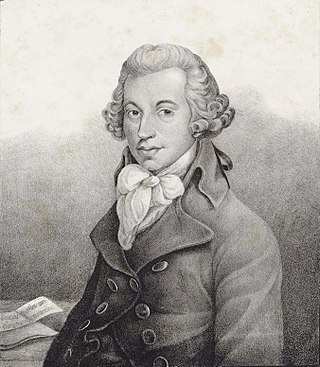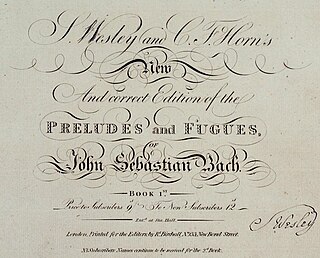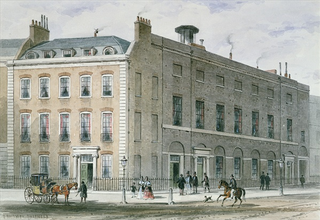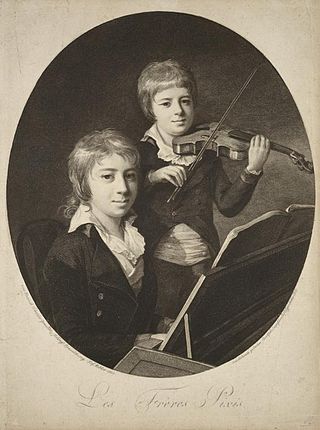
Carl Friedrich Abel was a German composer of the pre-Classical era. He was a renowned player of the viola da gamba, and produced significant compositions for that instrument. He was director of music at the Dresden court from 1743, and moved to London in 1759, becoming chamber-musician to Queen Charlotte in 1764. He founded a subscription concert series there with Johann Christian Bach. According to the Catalogue of Works of Carl Friedrich Abel (AbelWV), he left 420 compositions, with a focus on chamber music.
Kapellmeister, from German Kapelle (chapel) and Meister (master), literally "master of the chapel choir", designates the leader of an ensemble of musicians. Originally used to refer to somebody in charge of music in a chapel, the term has evolved considerably in its meaning and is today used for denoting the leader of a musical ensemble, often smaller ones used for TV, radio, and theatres.

Johann Christian Bach was a German composer of the Classical era, the youngest son of Johann Sebastian Bach. He received his early musical training from his father, and later from his half-brother, Carl Philipp Emanuel Bach in Berlin. After his time in Berlin he made his way to Italy to study with famous Padre Martini in Bologna. While in Italy, J.C. Bach was appointed as an organist at the Milan Cathedral. In 1762 he became a composer to the King’s Theatre in London where he wrote a number of successful Italian operas and became known as "The English Bach". He is responsible for the development of the sinfonia concertante form. He became one of the most influential figures of the classical period, influencing compositional styles of prolific musicians like Haydn and Mozart.
The year 1791 in music involved some significant events.

Johann Peter Salomon was a German violinist, composer, conductor and musical impresario. Although an accomplished violinist, he is best known for bringing Joseph Haydn to London and for conducting the symphonies that Haydn wrote during his stay in England. He also knew and worked with Wolfgang Amadeus Mozart and Ludwig van Beethoven.

Ignaz (Ignace) Joseph Pleyel was an Austrian composer, music publisher and piano builder of the Classical period. He grew up in Austria, and was educated there; in his mid-twenties he moved to France, and was based in France for the rest of his life.

Charles Frederick Horn was an English musician and composer. Born in the Holy Roman Empire, he emigrated to London with few possessions and no knowledge of the English language, yet rose to become a music teacher in the Royal Household. As an editor and arranger, he helped introduce the music of Johann Sebastian Bach to England.

Giovanni Andrea Battista Gallini, later known as Sir John Andrew Gallini, was an Italian dancer, choreographer and impresario who was made a "Knight of the Order of the Golden Spur" by the Pope following a successful performance.

The Hanover Square Rooms or the Queen's Concert Rooms were assembly rooms established, principally for musical performances, on the corner of Hanover Square, London, England, by Sir John Gallini in partnership with Johann Christian Bach and Carl Friedrich Abel in 1774. For exactly one century this was the principal concert venue in London. The premises were demolished in 1900.
Luigi Borghi was an Italian violinist and composer, living in London, particularly involved with orchestras of opera houses.

Charlotte Louise Henriette Papendiek was a lady-in-waiting to the British queen Charlotte of Mecklenburg-Strelitz.
Joseph Dando was an English violinist and viola player. He introduced the first public concerts of chamber music in England.

Friedrich Wilhelm Pixis was a German violinist. He became professor of violin at Prague Conservatory and was important in the musical life of Prague.
Charles Frederick Baumgarten was a German-born violinist, organist, composer and teacher, living in London.
The "Vocal Concerts" were subscription concerts in London, given from 1792 to 1794 and from 1801 to 1821. Leading singers of the day performed at the concerts.

The Pleyel Museum is in Ruppersthal, a village near the town of Großweikersdorf in Lower Austria. It is the birthplace of the composer, piano manufacturer and music publisher Ignaz Pleyel (1757–1831), and is now dedicated to his life and work.
Harriet Wainwright Stewart was a British composer, singer, and writer. A musical entrepreneur, she developed a subscription list of several hundred people and sold at least two of her compositions to subscribers.
Johanna Magdalena Willmann was a German soprano, one of a family of musicians. She appeared in Bonn and at the court opera in Vienna.
The Wednesday Concerts were a series of concerts held at Exeter Hall in London, established in 1848 and discontinued in 1850.











